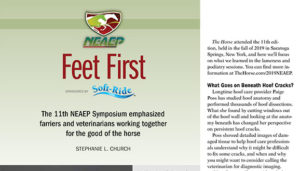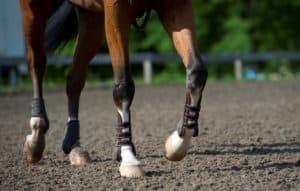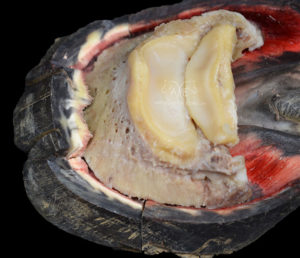
Control Your Horse’s Weight and Other Ways to Prevent, Treat Laminitis
Dr. Andrew van Eps suggests addressing obesity now to prevent laminitis, shares new insight into supporting limb laminitis, and offers advice about icing feet in acute cases.
The 11th annual Northeast Association of Equine Practitioners Symposium took place Sept. 25-28, 2019, in Saratoga Springs, New York.
Watch TheHorse.com for recaps of presentations in coming weeks.
Convention coverage is brought to you by Soft-Ride.

Dr. Andrew van Eps suggests addressing obesity now to prevent laminitis, shares new insight into supporting limb laminitis, and offers advice about icing feet in acute cases.

Veterinarians need to assess horses, diagnose the cause of pain, and start medical management early for the best prognosis.

Digital flexor tendon sheath pathology can be difficult to diagnose and treat successfully. Here’s a look at Dr. Florent David’s approach, which he presented at the 2019 NEAEP Symposium.

Researcher: Treating chronic laminitis will always be difficult, so prevention is key.

UK researcher: Evidence-based studies are lacking; here are my experiences and shoeing strategies.

The 11th NEAEP symposium emphasized farriers and veterinarians working together for the good of the horse. Read our in-depth coverage in this free report, sponsored by Soft-Ride.

Researcher: Horses with osteoarthritis could one day benefit from a preventive approach using PAAG.

Dissections show that a well-developed caudal foot maintains it shape and does its job protecting the hoof and joints from concussion.

Bowker: Long toes and underrun heels set horses up for failure. Here are recommendations for an improved trim to help correct this condition.

Dissections showing underlying bone loss can help hoof care professionals know how to manage different types of hoof capsule damage.

Initiating rehab methods earlier might promote healthier foot structures and reverse tissue degeneration.
The annual conference will cover topics ranging from barefoot trimming and laminitis treatment to eye and respiratory disease.
Stay on top of the most recent Horse Health news with
© 2022 Copyright Statement dolor sit amet, consetetur sadipscing User Terms, sed diam nonumy eirmod tempor invidunt ut labore et dolore magna aliquyam erat, sed diam voluptua. At vero eos et accusam et justo duo dolores et ea rebum. Stet clita kasd gubergren, no sea takimata sanctus est Lorem ipsum dolor sit amet.
"*" indicates required fields